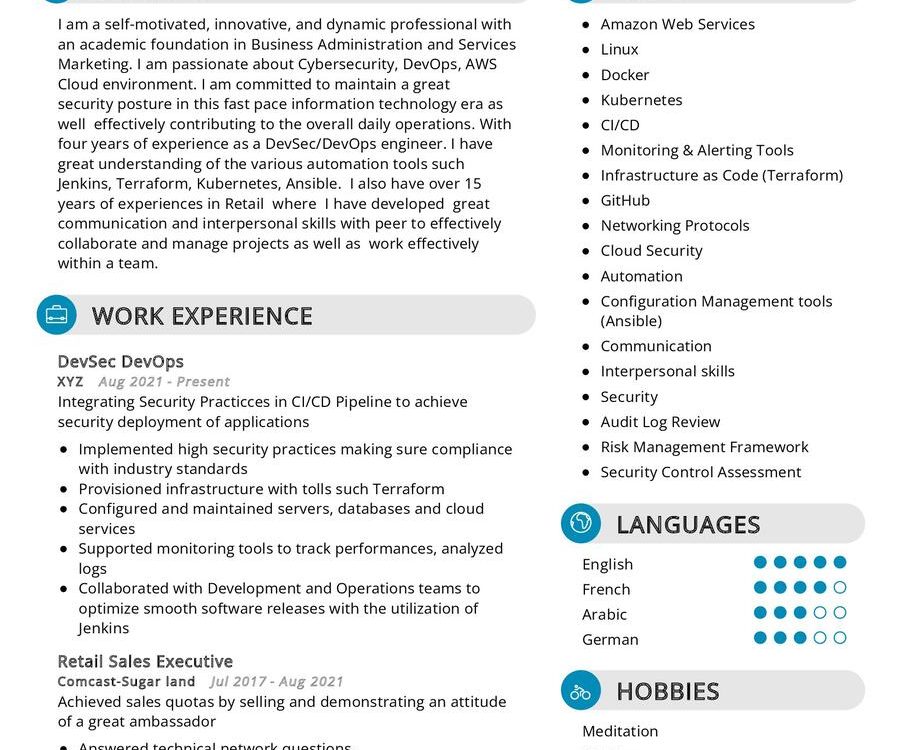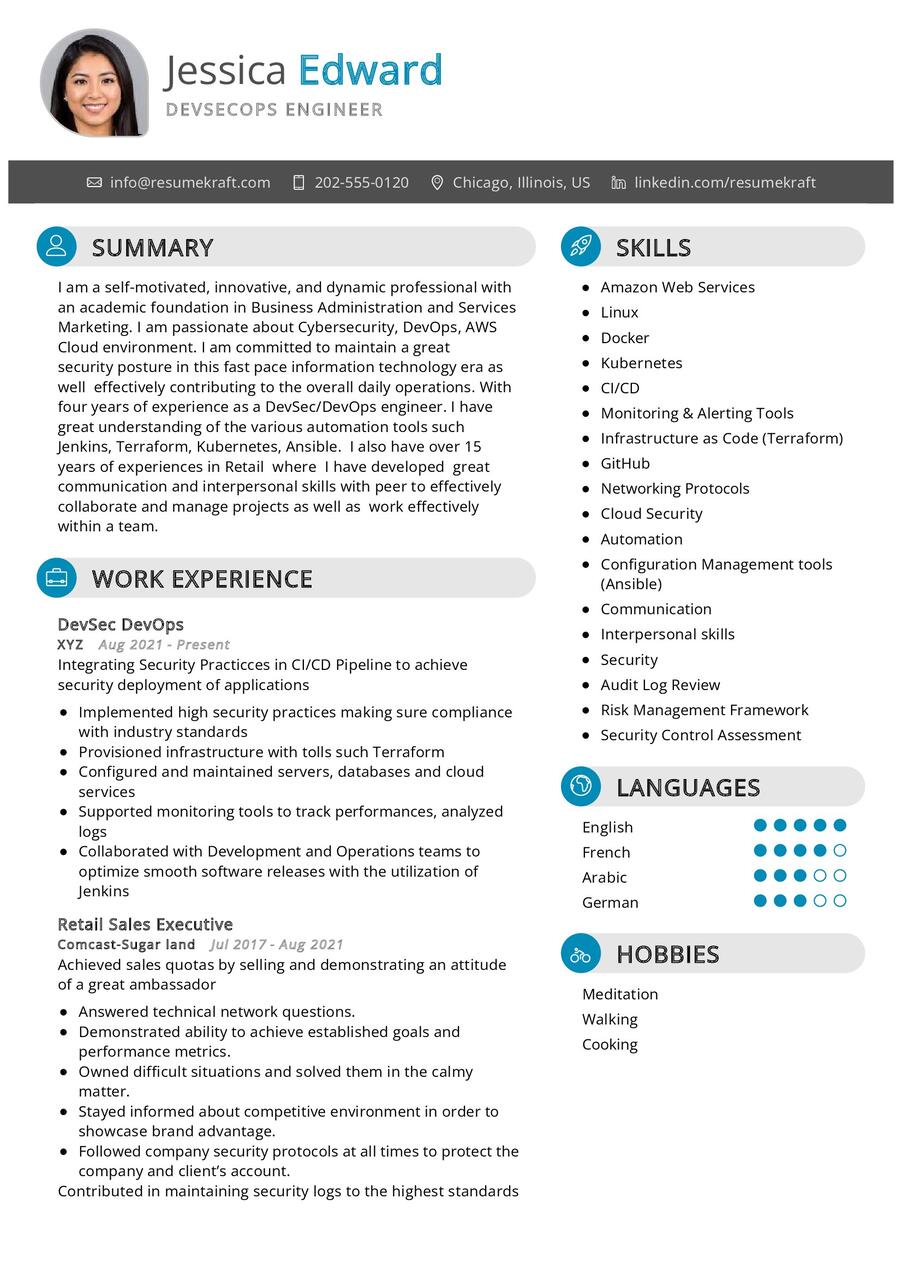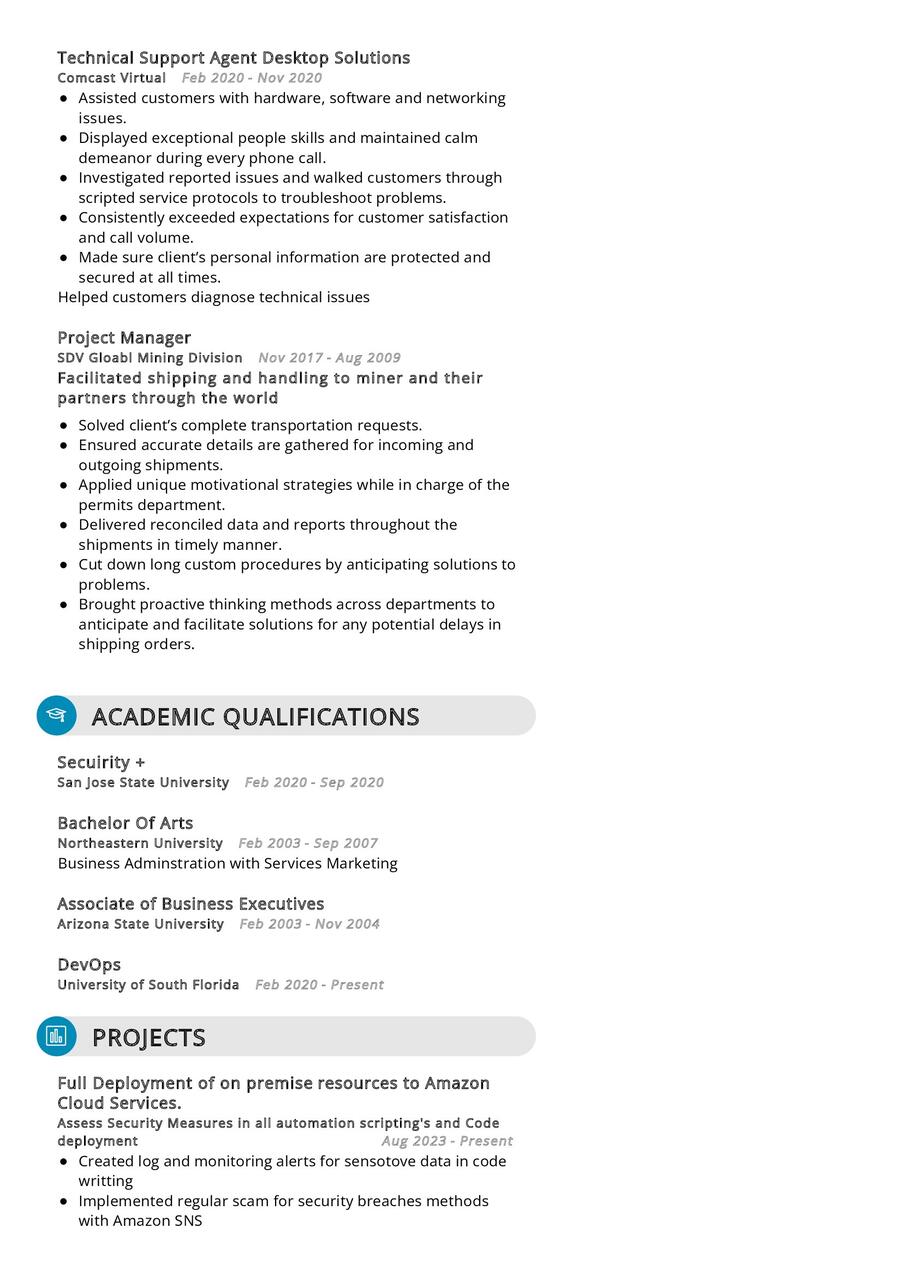Are you a DevSecOps Engineer by profession and looking for a career change? We have good news for you! use our job-winning professional DevSecOps Engineer Resume Sample template. You don’t have to start writing from scratch. Just click “Edit CV” and modify it with your details. Update the template fonts and colors to have the best chance of landing your dream job. Find more CV Templates.
The Crucial Role of a DevSecOps Engineer
As organizations navigate the intricate landscapes of modern software development and cybersecurity, the role of a DevSecOps Engineer emerges as a linchpin in ensuring the seamless integration of security practices within the DevOps pipeline. This article explores the multifaceted responsibilities, necessary skills, and key requirements that define the role of a DevSecOps Engineer.
DevSecOps Engineer Job Requirements
Transitioning into the role of a DevSecOps Engineer involves meeting specific prerequisites, marking a journey of continuous learning and hands-on experience. Let’s delve into the essential requirements that make a proficient DevSecOps Engineer:
- A degree in Computer Science, Information Technology, or a related field, establishing a solid foundation in the technical domain.
- Comprehensive understanding of DevOps practices and principles, with hands-on experience in implementing DevOps methodologies.
- Expertise in security practices, including knowledge of vulnerabilities, threat modeling, and risk assessment.
- Experience in scripting and coding languages such as Python, Shell, or Ruby, essential for automating security processes in the development pipeline.
- Familiarity with cloud platforms and containerization tools like Docker and Kubernetes, integral in securing cloud-native applications.
- Certifications in cybersecurity and DevOps, such as Certified DevOps Engineer or Certified Information Systems Security Professional (CISSP), add credibility to your profile.
- Effective communication skills and the ability to collaborate across development, operations, and security teams.
Obtaining additional certifications in cybersecurity and staying abreast of industry trends enhance your competitiveness in the job market.
DevSecOps Engineer Responsibilities
The role of a DevSecOps Engineer encapsulates a spectrum of responsibilities, weaving together technical acumen, collaboration, and a proactive approach to security. Let’s unravel the core responsibilities that define this dynamic role:
- Integrating security into the DevOps pipeline, ensuring security measures are seamlessly embedded throughout the software development life cycle (SDLC).
- Performing continuous security assessments, identifying vulnerabilities, and implementing remediation strategies.
- Automating security processes, using scripts and tools to enhance the efficiency and effectiveness of security practices.
- Collaborating with development and operations teams to prioritize and address security concerns in a timely manner.
- Conducting threat modeling exercises to anticipate potential security risks and implementing preventive measures.
- Monitoring and responding to security incidents, employing incident response plans to mitigate and learn from security breaches.
- Staying current with evolving cybersecurity threats and technologies, proactively adapting security measures accordingly.
Each responsibility is a thread in the tapestry of securing the DevOps landscape, showcasing the role’s significance in the modern technological paradigm.
DevSecOps Engineer Resume Writing Tips
Crafting a compelling resume as a DevSecOps Engineer requires a strategic approach to highlight your unique blend of technical expertise and security prowess. Consider the following tips to narrate your career story effectively:
- Emphasize your experience in implementing security measures within the DevOps pipeline, showcasing specific projects and their impact on overall security.
- Detail your proficiency in scripting languages, providing examples of how you’ve automated security processes for increased efficiency.
- Showcase your collaboration skills by highlighting instances where you’ve successfully worked with cross-functional teams to address security concerns.
- Quantify your achievements, using metrics to demonstrate the effectiveness of your security strategies and the reduction of vulnerabilities.
- List relevant certifications, underlining your commitment to continuous learning and staying updated on the latest cybersecurity trends.
- Customize your resume for each application, aligning your skills and experiences with the specific requirements of the DevSecOps role.
Each tip serves as a brushstroke, helping you paint a resume that reflects your unique value as a DevSecOps Engineer.
DevSecOps Engineer Resume Summary Examples
Your resume summary serves as the gateway to your professional journey, offering a snapshot of your skills and experiences as a DevSecOps Engineer. Consider these examples to inspire your own summary:
- “DevSecOps Engineer with a proven track record in seamlessly integrating security measures into the DevOps pipeline, reducing vulnerabilities by 30% through automation and collaboration.”
- “Experienced cybersecurity professional specializing in DevSecOps, adept at conducting threat assessments and implementing robust security practices, contributing to a 20% improvement in overall system security.”
- “Results-driven DevSecOps Engineer with a passion for automating security processes, leveraging scripting languages to enhance efficiency and fortify the software development life cycle.”
Each summary is a snapshot of your journey, showcasing your skills and impact as a DevSecOps Engineer.
Create a Robust Experience Section for Your DevSecOps Engineer Resume
Your experience section is the narrative core of your resume, detailing the impactful chapters of your career as a DevSecOps Engineer. Consider these examples to guide you in crafting an engaging experience section:
- “Led the implementation of a DevSecOps strategy, reducing the time to identify and remediate vulnerabilities by 50% and enhancing overall system security.”
- “Collaborated with development teams to integrate automated security testing, resulting in a 25% reduction in security-related defects during the development phase.”
- “Managed incident response processes, successfully mitigating security incidents and implementing lessons learned to fortify future security measures.”
Each experience narrates a chapter in your DevSecOps journey, highlighting achievements and contributions to the security landscape.
Educational Background for Your DevSecOps Engineer Resume
Your educational journey forms the foundation of your career as a DevSecOps Engineer. Showcase your academic achievements with examples like:
- Master of Science in Cybersecurity, XYZ University, 2019.
- Bachelor of Science in Computer Science, ABC University, 2015.
- Certified Information Systems Security Professional (CISSP), demonstrating expertise in cybersecurity, 2020.
Each educational milestone underscores your commitment to knowledge and expertise in the field of cybersecurity and DevSecOps.
DevSecOps Engineer Skills for Your Resume
Your skill set as a DevSecOps Engineer is a powerful arsenal that sets you apart in the competitive landscape. Highlight your skills, both soft and hard, to convey your capabilities effectively:
Soft Skills:
- Collaboration and teamwork, essential for working seamlessly with development, operations, and security teams.
- Effective communication, the ability to convey complex security concepts to diverse stakeholders.
- Problem-solving, a knack for identifying and mitigating security risks in dynamic software development environments.
- Adaptability and flexibility, crucial for navigating the evolving landscape of cybersecurity threats and technologies.
- Attention to detail, ensuring comprehensive security assessments and thorough implementation of security measures.
Hard Skills:
- Proficiency in scripting languages such as Python, Shell, or Ruby, for automating security processes.
- Knowledge of cybersecurity frameworks and best practices, essential for creating robust security protocols.
- Experience with cloud platforms (e.g., AWS, Azure) and containerization tools (e.g., Docker, Kubernetes).
- Understanding of DevOps practices, principles, and tools, for seamless integration of security measures.
- Incident response and management skills, crucial for effectively handling and learning from security incidents.
Each skill in your toolbox contributes to your effectiveness as a DevSecOps Engineer, ensuring the security and integrity of software development processes.
Common Mistakes to Avoid When Writing a DevSecOps Engineer Resume
Steer clear of common pitfalls to create a DevSecOps Engineer resume that stands out. Avoid these mistakes:
- Using generic language, failing to highlight your unique combination of DevOps and cybersecurity expertise.
- Listing job duties without emphasizing your specific contributions and impact on security measures.
- Neglecting to include a cover letter, missing an opportunity to personalize your application and convey your passion for DevSecOps.
- Overloading your resume with technical jargon, potentially alienating non-technical hiring managers.
- Failing to proofread, a mistake that can undermine your professional image and attention to detail.
Avoiding these mistakes ensures that your DevSecOps Engineer resume is both authentic and compelling, showcasing your unique value.
Key Takeaways for Your DevSecOps Engineer Resume
As you craft your DevSecOps Engineer resume, keep these key points in mind to create a document that effectively communicates your expertise and impact:
- Highlight your success stories in seamlessly integrating security measures into the DevOps pipeline.
- Emphasize your automation skills, showcasing examples of how you’ve used scripting languages to enhance security processes.
- Showcase your collaboration experiences, detailing successful interactions with cross-functional teams to address security concerns.
- Quantify your achievements, using metrics to demonstrate the effectiveness of your security strategies.
Finally, feel free to utilize resources like AI Resume Builder, Resume Design, Resume Samples, Resume Examples, Resume Skills, Resume Help, Resume Synonyms, and Job Responsibilities to create a standout application and prepare for the DevSecOps Engineer job interview questions.</
Career Expert Tips:
- Always make sure you choose the perfect resume format to suit your professional experience.
- Ensure that you know how to write a resume in a way that highlights your competencies.
- Check the expert curated popular good CV and resume examples



